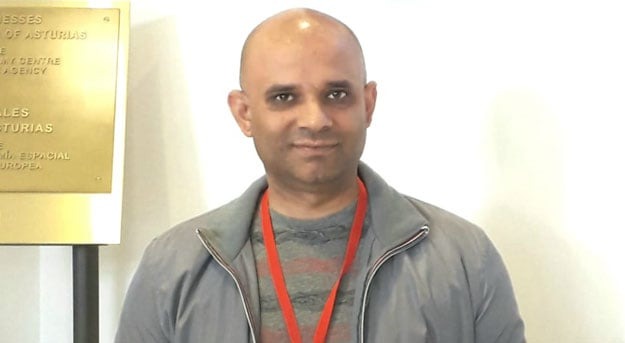ISLAMABAD – A Pakistan-born scientist, Dr Nozair Khawaja, has earned honour for his motherland as he was part of the team that has discovered Phosphorus, a key chemical element for many biological processes, in icy grains emitted by the small moon of Saturn.
Using data collected by NASA’s Cassini mission, an international team of scientists led by Frank Postberg has discovered the essential chemical element, showed the new student published in the journal Nature. It is locked inside salt-rich ice grains ejected into space from Enceladus.
The small moon is known to possess a subsurface ocean, and water from that ocean erupts through cracks in Enceladus’ icy crust as geysers at its south pole, creating a plume. The plume then feeds Saturn’s E ring (a faint ring outside of the brighter main rings) with icy particles.
During its mission at the gas giant from 2004 to 2017, Cassini flew through the plume and E ring numerous times. Scientists found that Enceladus’ ice grains contain a rich array of minerals and organic compounds – including the ingredients for amino acids – associated with life as we know it.
Phosphorus, the least abundant of the essential elements necessary for biological processes, hadn’t been detected until now. The element is a building block for DNA, which forms chromosomes and carries genetic information, and is present in the bones of mammals, cell membranes, and ocean-dwelling plankton. Phosphorus is also a fundamental part of energy-carrying molecules present in all life on Earth. Life wouldn’t be possible without it.
“We previously found that Enceladus’ ocean is rich in a variety of organic compounds,” said Frank Postberg, a planetary scientist at Freie Universität Berlin, Germany, who led the new study, published on Wednesday, June 14, in the journal Nature. “But now, this new result reveals the clear chemical signature of substantial amounts of phosphorus salts inside icy particles ejected into space by the small moon’s plume. It’s the first time this essential element has been discovered in an ocean beyond Earth.”
Previous analysis of Enceladus’ ice grains revealed concentrations of sodium, potassium, chlorine, and carbonate-containing compounds, and computer modeling suggested the subsurface ocean is of moderate alkalinity – all factors that favor habitable conditions.
Dr Khawaja, a distinguished planetary scientist of Pakistani origin, has established himself at Freie University Berlin in Germany. He has contributed and led several breakthrough research projects in the past. He was associated with NASA’s Cassini space mission and now he is a professional affiliate of NASA’s future Europa Clipper space mission.
Dr Khawaja is also a co-investigator of a dust instrument Destiny Dust Analyser (DDA) that will be part of JAXA’s Destiny Plus space mission to investigate an asteroid Phaethon.
He is also a co-investigator member of a BioSign project related to experiments at the International Space Station (ISS) to support future space missions to search for life on Mars and icy moons. He is also a principle investigator of a newly-established hydrothermal facility at Freie University Berlin.
Dr Nozair Khawaja is working on multiple international projects related to astrobiology and the founder of Astrobiology Network of Pakistan (ABNP) — a network of volunteers — to promote astrobiology and space exploration in Pakistan.














